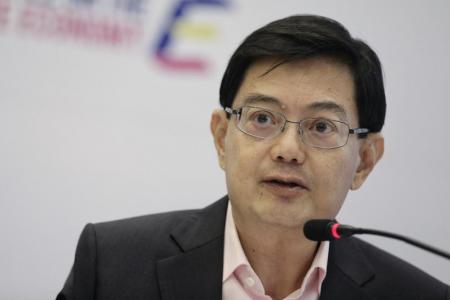Govt accepts committee’s proposal to shape Singapore’s future
Government accepts high-powered committee's proposed strategies to shape Singapore's future
Singaporeans will soon get more opportunities to upgrade their skills, gain knowledge from abroad and enrol in technology-enabled training programmes.
These are some of the key recommendations in a report by the Committee on the Future Economy (CFE).
The 30-member committee, comprising business and government leaders co-chaired by Finance Minister Heng Swee Keat and Minister for Trade and Industry (Industry) S. Iswaran, was set up in 2015 to identify future growth industries and markets, and help firms seize opportunities in those areas, among other things.
The panel consulted more than 9,000 stakeholders such as trade associations and chambers, public agencies, unions, companies, executives, workers, academics and students.
Yesterday, Mr Heng and the CFE members released the 109-page report at a press conference.
"We cannot know which industries will succeed. What we do know is that Singapore must stay open to trade, talent and ideas, and build deep capabilities," the committee said.
"By being innovative, bold and willing to change, by remaining open to the world and deepening our knowledge of markets everywhere, our businesses and people can grasp the opportunities that this new environment offers, and Singapore can continue to prosper.
"We call upon the Singaporeans of today, young and old, to be the pioneers of the next generation."
Its seven key recommendations are:
- Deepen and diversify our international connections.
- Acquire and utilise deep skills.
- Strengthen enterprise capabilities to innovate and scale up.
- Build strong digital capabilities.
- Develop a vibrant and connected city of opportunity.
- Develop and implement industry transformation maps.
- Partner one another to enable growth and innovation.
On workers acquiring deep skills to stay relevant, the CFE recommended that training providers and institutes of higher learning offer more modularised and technology-enabled training programmes, on top of the 500 existing courses.
It also urged the Government to set up an online, one-stop education, training and career guidance portal, and improve on its existing support schemes to ensure that older, disabled, and at-risk workers can benefit.
Human relations expert Paul Heng, founder of NeXT Career Consulting Group, echoed the CFE's push for more initiatives to help workers upgrade their skills, especially when Singapore is undergoing structural changes.
"The importance cannot be overemphasised because our future depends on human talent as we don't have other natural resources. If our workforce's skills sets continue to be mismatched with the needs, it will only lead to its detriment," he said.
Association of Small and Medium Enterprises president Kurt Wee told The New Paper that this could also allow for more individuals to develop skills and expertise that are to their own strengths and interest.
"I don't think Singaporeans are resistant, but there's a lot of headroom for more active approach by individuals," he said.
"Some fear the unknown, but they can be encouraged as we already see a lot of people going for training and upgrading on their own.
"This takes time, but signs are encouraging and this (report) is a step in the right direction."
Prime Minister Lee Hsien Loong said the Government accepts the strategies proposed and will pursue all of them.
He noted that developing the strategies is the first step: "What counts is how well we implement them to transform our economy."
Get The New Paper on your phone with the free TNP app. Download from the Apple App Store or Google Play Store now



